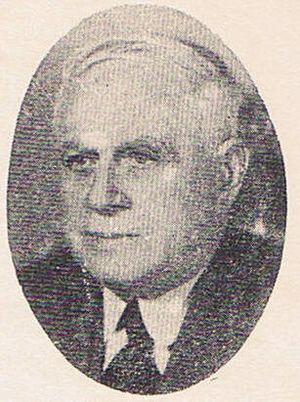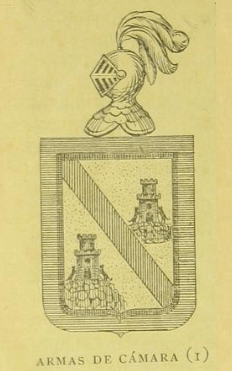Nicolás Cámara Vales facts for kids
Quick facts for kids
Nicolás Cámara Vales
|
|
|---|---|
 |
|
| Governor of Yucatán | |
| In office 1912–1913 |
|
| Preceded by | Agustín Patrón Correa |
| Succeeded by | Fernando Solís León |
| Governor of Yucatán | |
| In office 1911–1911 |
|
| Preceded by | José María Pino Suárez |
| Succeeded by | Agustín Patrón Correa |
| Personal details | |
| Born | 1875 Mérida, Yucatán, Mexico |
| Died | 1956 (aged 81) Mexico City, Mexico |
| Political party | Progressive Constitutionalist Party |
| Spouse | Joaquina Millet Heredia |
| Children | Berta Nicolás Jorge |
| Parents | María del Carmen Vales Castillo (mother) Raymundo Cámara Luján (father) |
| Relatives | Pino- Cámara family María Cámara Vales (sister) José María Pino Suárez (brother-in-law) Alfredo Cámara Vales (brother) Agustín Vales Castillo (uncle) Pablo Castellanos León (brother-in-law) Pablo Castellanos Cámara (nephew) Fernando Cámara Barbachano (nephew) Ismael Moreno Pino (grandnephew) |
| Residence | Mérida, Yucatán |
| Alma mater | University of Berlin (M.D) |
| Occupation | Pediatrician, politician and diplomat |
| Profession | Doctor of Medicine |
Nicolás Cámara Vales (1875 — 1956) was an important Mexican politician, diplomat, and physician. He served as the governor of Yucatán twice between 1911 and 1913. This was during a very important time in Mexico, known as the Mexican Revolution.
He studied medicine at the University of Berlin in Germany. After becoming a doctor, he returned to Mérida and became a pediatrician. He even opened the first children's hospital in the Yucatán Peninsula.
Nicolás Cámara Vales believed in liberalism, which means he supported ideas like freedom and democracy. He joined José María Pino Suárez, who was his brother-in-law, to support Francisco I. Madero. Madero wanted to make Mexico more democratic.
When Madero became president and Pino Suárez became vice-president, Cámara Vales served as governor of Yucatán. He was first an interim (temporary) governor, then he was elected for his own term. However, the Madero government was overthrown in a military takeover called the Ten Tragic Days. Madero and Pino Suárez were sadly killed.
After these events, Cámara Vales lived in Europe and the United States for several years. He continued to work as a doctor there. Later, he became a Consul-General (a type of diplomat) in Berlin and Vienna. He also helped create a special group called the Henequen Regulatory Commission when he was governor. Later, he became its leader.
Contents
Biography
Early Life and Family
Nicolás Cámara Vales was born in Mérida, Yucatán on April 25, 1875. He was the oldest son of Raymundo Cámara Luján and María del Carmen Vales Castillo. His father was a rich landowner and businessman. He made a lot of money during the time when henequen (a plant used to make rope) was very popular in Yucatán.
His family, the Pino-Cámara family, was an old and important family. They were descendants of some of the military leaders who helped the Spanish conquer Yucatán. For example, he was a direct descendant of Juan de la Cámara. Juan de la Cámara was a Spanish explorer and nobleman who helped found Mérida in 1542.
Nicolás had several notable family members. His older sister, María Cámara Vales, received a special award called the Belisario Domínguez Medal of Honor in 1969. Her husband, José María Pino Suárez, was the Vice President of Mexico from 1911 to 1913. Nicolás's younger brother, Alfredo Cámara Vales, served as the Governor of Quintana Roo.
Education and Marriage
Nicolás and his twelve siblings grew up in a home that valued learning. They learned music and foreign languages. Nicolás played the violin and piano. He could speak English, Spanish, French, and German very well.
He studied medicine at the University of Berlin in Germany. He earned his Doctor of Medicine degree in 1896. His final paper was about a disease called "The Pellagra in Yucatán."
He married Joaquina Millet Heredia. Her father, José María Millet Hübbe, was a successful businessman. Nicolás and Joaquina had three children:
- Berta Cámara Millet
- Nicolás Cámara Millet
- Jorge Carlos Cámara Millet
Career in Medicine and Politics
After finishing his medical studies, Nicolás Cámara Vales became a specialist in pediatrics, which is the medical care of children. He returned to Mérida and opened the first children's hospital in the Yucatán Peninsula.
Nicolás Cámara Vales believed in liberal ideas. He became good friends with Francisco I. Madero, who was also a close friend of his family. He also worked closely with his brother-in-law, José María Pino Suárez.
He joined the Progressive Constitutionalist Party. He worked hard in his home state to support Madero's goals. In the 1911 election for governor, Cámara Vales helped convince many powerful families in Yucatán to support José María Pino Suárez. Pino Suárez won the election.
However, Pino Suárez's time as governor was short. He was elected as the Vice President of Mexico in 1911. After Pino Suárez resigned as governor, the local government chose Nicolás Cámara Vales to be the temporary governor of Yucatán.
As temporary governor, Cámara Vales organized new elections for governor in 1912. He decided to run for governor himself. To make sure the election was fair, he stepped down from his temporary role. Agustín Patrón Correa took his place for a short time.
After winning the 1912 election, Nicolás Cámara Vales became governor again. During his time as governor, he achieved something very important. He ordered the creation of the Henequen Regulatory Commission (Comisión Regulatoria de la Industria del Henequen).
In the late 1800s and early 1900s, the henequen industry was very profitable for Yucatán. However, a powerful former governor, Olegario Molina, had controlled prices to benefit himself. This created a monopoly, meaning he had almost complete control. The new commission was created to control the henequen industry. Its goal was to prevent people from unfairly changing prices and doing other corrupt things.
In January 1913, Nicolás Cámara Vales temporarily left his position as governor to visit his sister, María Cámara, in Mexico City. Fernando Solís León, the Mayor of Mérida, became the acting governor.
While Nicolás was in Mexico City, a major event happened. A military takeover, known as the Ten Tragic Days, overthrew the Madero government. The new leader, Victoriano Huerta, ordered the former president and vice-president to be killed on February 22, 1913.
Because he was connected to the Madero government, Nicolás was in danger. He returned to Mérida with his sister and nephews. Soon after, he left Yucatán on a steamboat to Havana. Like other members of the Madero and Pino-Cámara families, he lived in exile (away from his home country) in the United States and Europe during the rest of the Mexican Revolution.
Later Life and Diplomacy
During the years between World War I and World War II (known as the Interwar period), Nicolás Cámara Vales worked in the diplomatic service. He represented Mexico as a Consul General in Berlin and Vienna.
After many years living abroad, he returned to Yucatán. He then served as the chairman (leader) of the Henequen Regulatory Commission, the group he had helped create as governor.
Nicolás Cámara Vales passed away in Mexico City in 1956, when he was 81 years old.
Images for kids
See also
 In Spanish: Nicolás Cámara Vales para niños
In Spanish: Nicolás Cámara Vales para niños
 | Georgia Louise Harris Brown |
 | Julian Abele |
 | Norma Merrick Sklarek |
 | William Sidney Pittman |



